After two and a half hours of concert, Stu Mackenzie realized he had prepared a set list that would not allow King Gizzard and the Lizard Wizard to cover the entire three-hour show at Forest Hills Stadium in Queens, New York. “That doesn't usually happen. In fact, we often have to take songs out.”
The thing is, the Australian band didn't rehearse enough for the tour. Instead, in the three weeks leading up to it, Mackenzie, Ambrose Kenny-Smith, Joey Walker, Cook Craig, Lucas Harwood and Michael Cavanagh worked on an “improvised techno” record. And who cares if they were about to release their 26th studio album? Flight b741. And who cares if they had 27 headliner concerts ahead of them to stream live for free online. Preparation has never been their forte. Their forte is making new music.
Mackenzie is okay with the band not being 100 percent ready before a tour. “I like the nerves, the anticipation, knowing that not everything is going to be perfect. For some reason, that gives me energy.” Yes, but it also left him wondering if he had enough music to play in front of 13,000 people at Forest Hills Stadium. In the middle of a song, he asked a roadie for a marker. “I counted how many minutes we could cover, starting from the bottom of the set list, and oh shit!” He then thought about his last show in New York, the previous night’s set list, and the one scheduled for the following night in the same stadium, to make sure he wasn’t repeating any songs. “And if you start thinking about all that stuff in the middle of a song, your brain goes mush.” He finally decided to go for it. Nuclear Fusiona piece from 2017. He told the band and called a fan to sing on stage. “And at that point… bomb.”
King Gizzard are used to improvising. They’ve been together since 2010, but only in the last few years have they gone from clubs to sold-out arenas. They started out as teenagers in Melbourne. Now they’ve released more than two dozen studio albums that they recorded, produced and pressed themselves. Partly thanks to this DIY mentality, they’ve amassed a legion of fans who call themselves the Weirdo Swarm. They’ve even given away entire albums and concert recordings to anyone who promises to print them, in exchange for a few copies. This mentality also led to the idea of streaming the tour online (except for the Philadelphia date, where they weren’t given permission to do so). “I want people to have access to our music,” says Mackenzie. “That’s all. I’m a millennial, and as such, I grew up downloading music off the internet. I’m a child of ‘everything for free,’ for better or worse.”
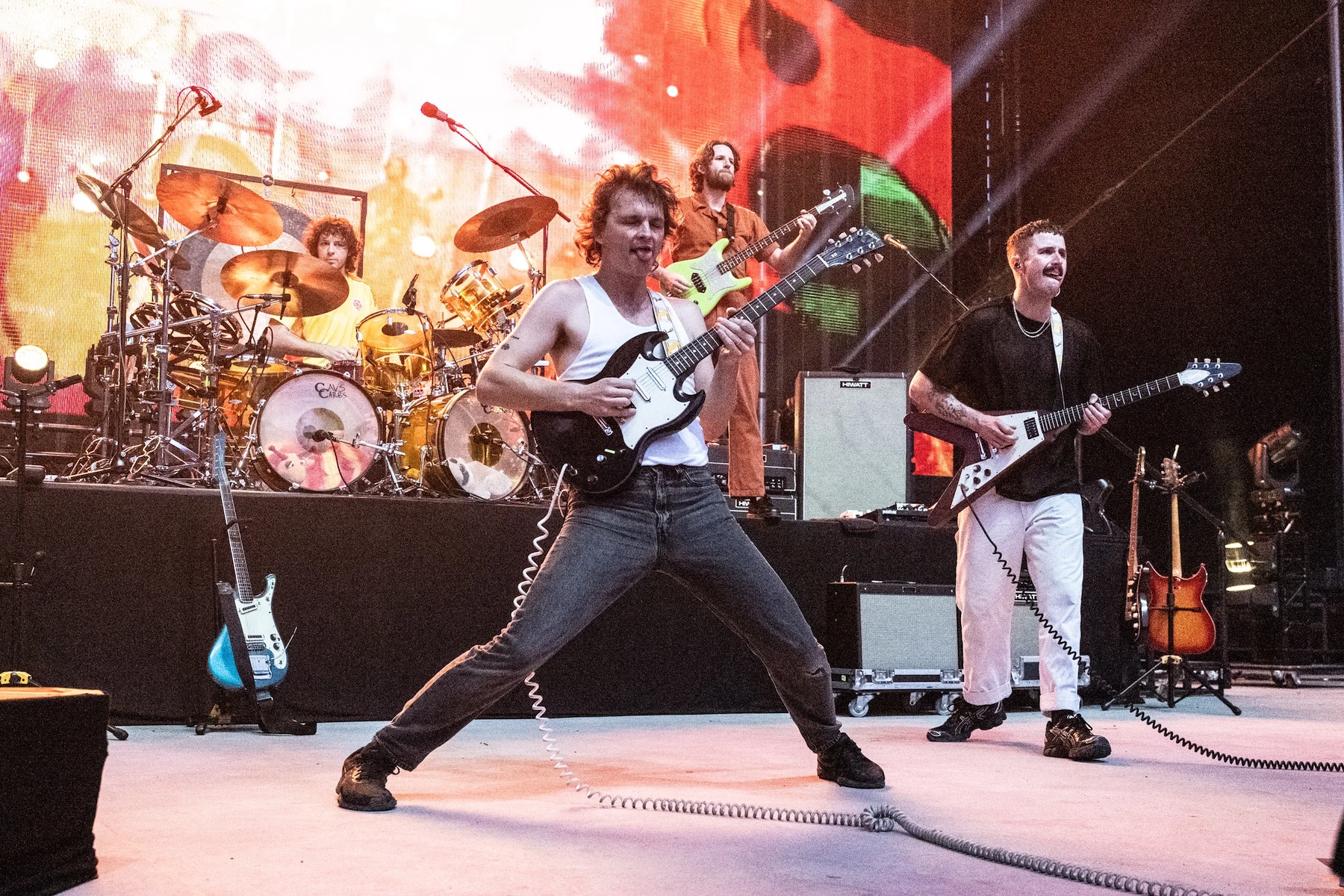
Photo: Sacha Lecca for Rolling Stone US
It's not easy trying to define King Gizzard's music. Some records border on metal, others are psychedelic or electronic or jazz or like Flying Microtonal Banana that at times doesn’t even sound like Western music. They all have one thing in common: a chaotic energy that borders on the maniacal. In recent years, they’ve started to think of themselves as a jam band because of the devoted fan base that follows them live. “But people have been following us from the beginning, show after show, and that’s despite us playing more or less the same songs every night,” says Mackenzie. “Maybe they saw something that we didn’t even notice.”
Mackenzie didn't even know what to make of the jam band label when they started using it for King Gizzard. Yes, he knew Grateful Dead records like American Beauty And Workingman's Deadbut he wasn't a fan. “I never got the psychedelic show stuff, maybe because it was never a phenomenon here in Australia, it never took root. I also considered the Dead a kind of country group. Great songs, sure, but I didn't really understand them.”
Now he understands them. “There's something similar in spirit. The world in which we make records and music is free, we've always been open to improvisation and we see ourselves in hippie ideals, even if we're a fucking punk-rock band made by millennials.”
The improvisational spirit also emerges from Flight b741although it has more to do with Steely Dan than Phish. “We wanted it to be spontaneous,” says Mackenzie. In 2023 they released two albums, the electronic The Silver Cord and the metalhead PetroDragonic Apocalypse“and they were both very intellectual.” Making them hadn't been easy. “It's good to test yourself and challenge yourself, but this time we wanted to do something more natural.”
When they met to record in October 2023, the idea was not to bring ideas that were too refined. “Everyone in the band is able to write the parts of the guitarist, the singer, the drummer, come and ask: 'Can you play this for me?'. We've made records and songs like that, based on the vision of one that was then embraced by everyone. This time we wanted to avoid that as much as possible.” And then three of the six musicians were about to become fathers and so they were forced to write and record the album in two weeks, an approach appreciated by Kenny-Smith: “It brought a whole other energy.” The result brought them closer to traditional rock, with echoes of arena rock and a pinch of glam. They are different than usual, but they are still them.
They’re so prolific because they have a kind of mystical reverence for the recording studio. “The stage is where we feel most confident, and that’s fine,” says Mackenzie, “but when we’re in the studio I want everyone to feel like we don’t know what we’re doing. The best things come when we learn something new or do things that are out of our league.” And all this without working under the supervision of a producer. “We don’t want our vision to become someone else’s vision. We just keep making records the way we’ve always made them.”
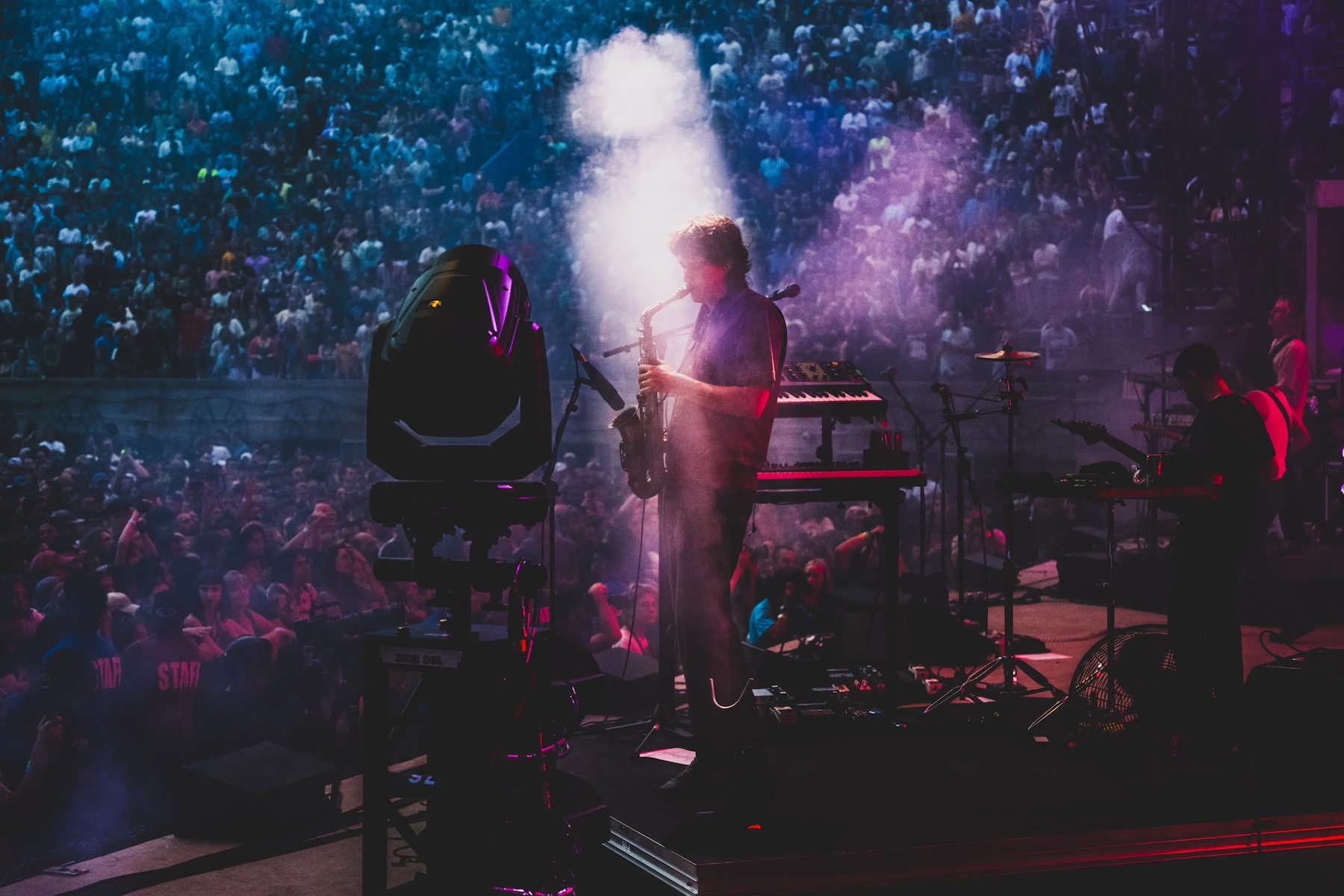
Photo: Sacha Lecca for Rolling Stone US
In 2012, they launched Flightless Records to release their own music and that of other Melbourne bands, including Amyl and the Sniffers. It became such a commitment that in 2020, drummer Eric Moore left the band to dedicate himself to the label. Around the same time, they launched KGLW, now p(doom), to release their own music exclusively, although earlier this year they announced that they would be releasing other people's records as well. It's a great DIY success story (they've partnered with labels like ATO and Heavenly in the past).
On this tour, in order to stream the concerts on YouTube, Mackenzie has had to cede some control to Jackson Devereux and Allen Dobbins, who film the shows, with the audio coming directly from the mixing desk where their engineer Sam Joseph sits. Artists usually prefer a custom mix, but this is the band’s DIY approach. “A lot of people are going to think we’re crazy,” Mackenzie says, “because that’s not the way to do it, because shit can happen at any time, but it’s free, so it’s okay for problems to arise and we can resolve them in good faith.”
And there have been problems, like the sound not being perfect or the stream interrupting. Fans report the errors on Reddit, the Gizzard team reads the comments and tries to fix them. Not that Mackenzie spends much time on Reddit. He prefers to interact with fans in other ways. In 2017, for example, the Bootlegger project was launched. It was a period in which the group was decidedly productive. “I felt guilty asking people to buy five records in a row, so I decided to give one away,” or Polygondwanaland«one of the ones we had worked hardest on, I didn't want to give away something of little importance». They sent the tracks to the few fans they thought were interested. «Within a short time, hundreds of physical records came out, incredible, the craziest thing that had happened to us up to that point».
Since then, they have released demos, concerts, a charity album after the bushfires in Australia and – this is a recent announcement – various tracks from each show of the tour. «There are record labels set up after you have printed Polygon“, says Mackenzie. “It’s incredible, it’s beautiful. I’m proud that I’ve made the world a more creative place not just with words.”
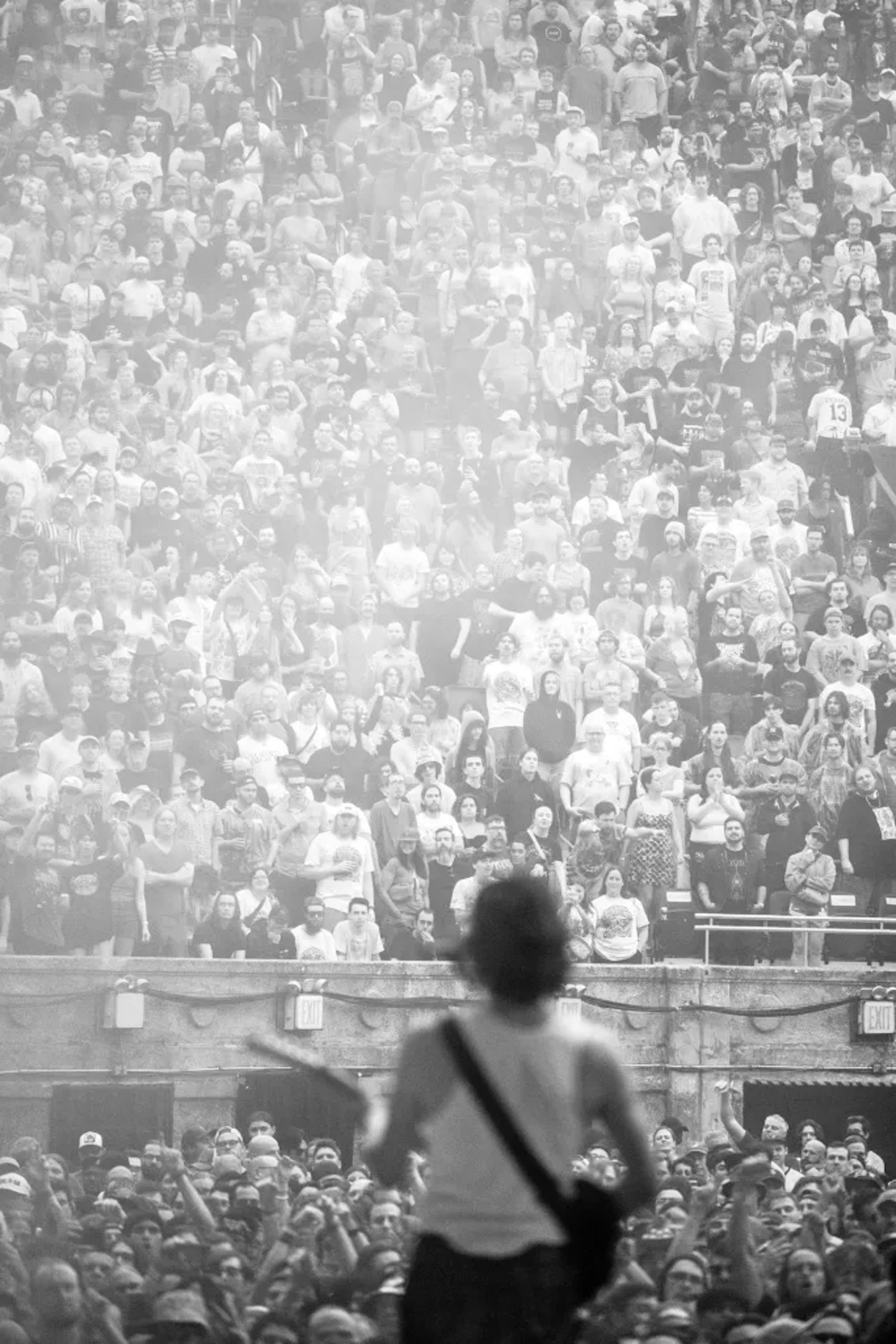
Photo: Sacha Lecca for Rolling Stone US
And then there’s the touring, which remains the moment of maximum connection with fans. According to KGLW.net, which keeps track, they’ve played more than 900 concerts and 52 tours in 45 different countries since 2010. Despite the complications of adult life, King Gizzard expect to keep up this frenetic pace in the future. “We already knew before we became fathers how to handle life on tour in a healthy way. In the past, we were away too long, it wasn’t healthy, not even for the internal relationships of the band. But we love each other, which helps. There have been disagreements, arguments, fights, but we take care of each other. And I don’t think that can be said for all bands.”
They too have found themselves facing the typical problems of those approaching adult life. “Becoming a father changes you, that's for sure. I have two children and I hate being away from them. More than anything else, I worry about them missing me. I'm grateful for what I can do between children, bands, various commitments.”
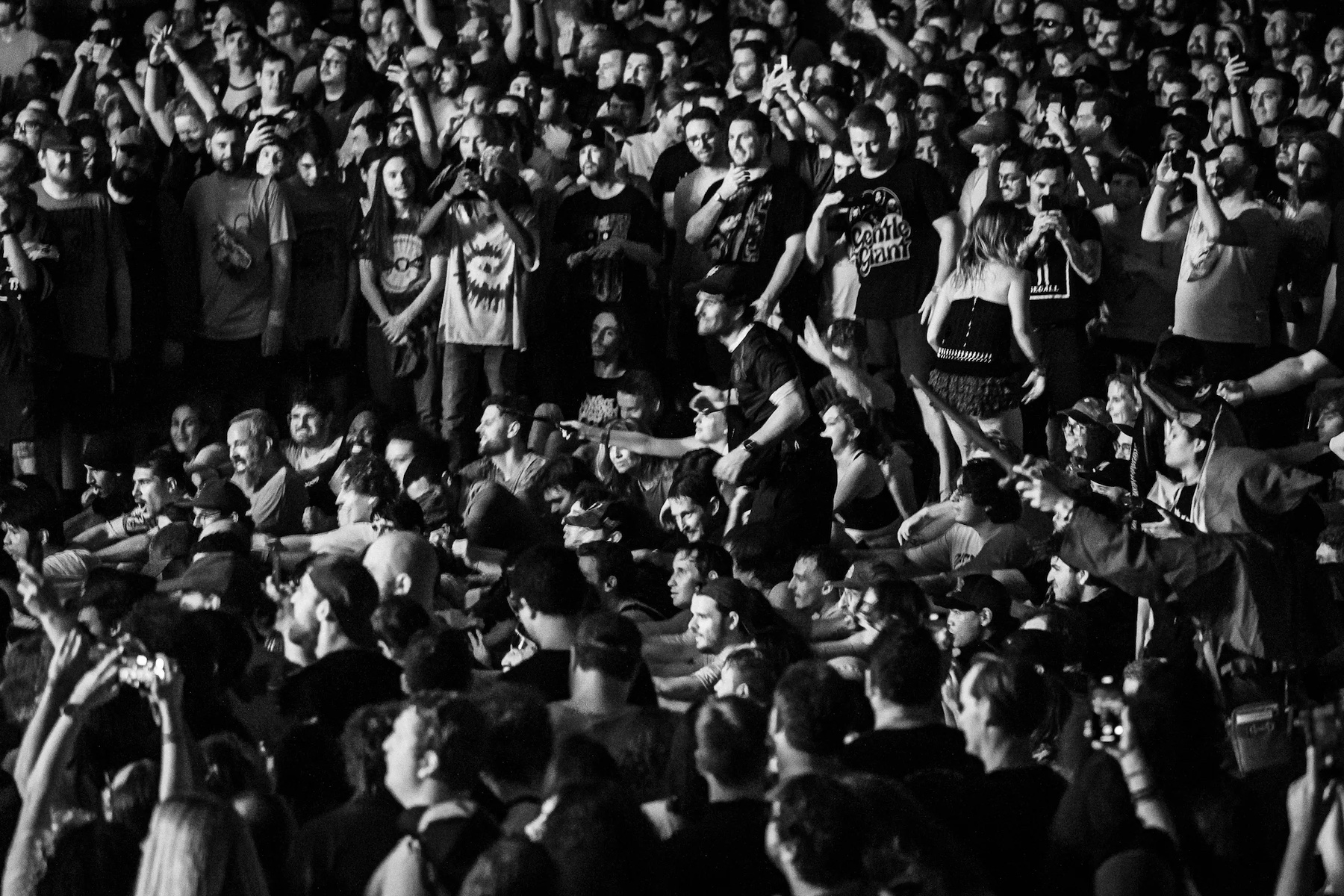
Photo: Griffin Lotz for Rolling Stone US
As if that wasn't enoughKing Gizzard are shooting a movie with Guy Tyzack and Maclay Heriot. They don't know what form it will take yet, but the two directors also watch with their cameras as we interview each other in the backyard of a pool at the Forest Hills Tennis Club, which is where the first US Open was held. The concert has just finished and Mackenzie is still buzzing from the three hours he spent on stage. It's a fun scene that feels more like someone's house party in the '90s than an after-party (and later, comedian Eric André will also come to take a dip in the pool).
The two Forest Hills shows are a homecoming of sorts for the group with roots in upstate New York. A decade ago, they were playing wherever they could at small venues like Wild Kingdom and more famously known as Baby’s All Right and the Knitting Factory, sleeping on friends’ floors in Brooklyn while recording near Hunter Mountain. “We were 21 to 25, just kids,” Mackenzie says. “We were still figuring out how things worked or how to make enough money to make noodles and play as much as possible. We grew up a lot, we grew up together, we became a family.”
Kenny-Smith remembers it as a time of intense creative energy: “The atmosphere was vibrant and obviously New York was the place to be for twenty-year-olds.” He recalls sessions in the Catskills, holed up for days on end writing songs or playing cards. GoldenEye 007 on the Nintendo 64, only going out for concerts or to do the shopping. «I felt like I was Macaulay Culkin in Mom, I missed the planeshopping once a week, everything in bulk in the cart, instant noodles, microwave popcorn, anything that would allow us to survive locked in there.”
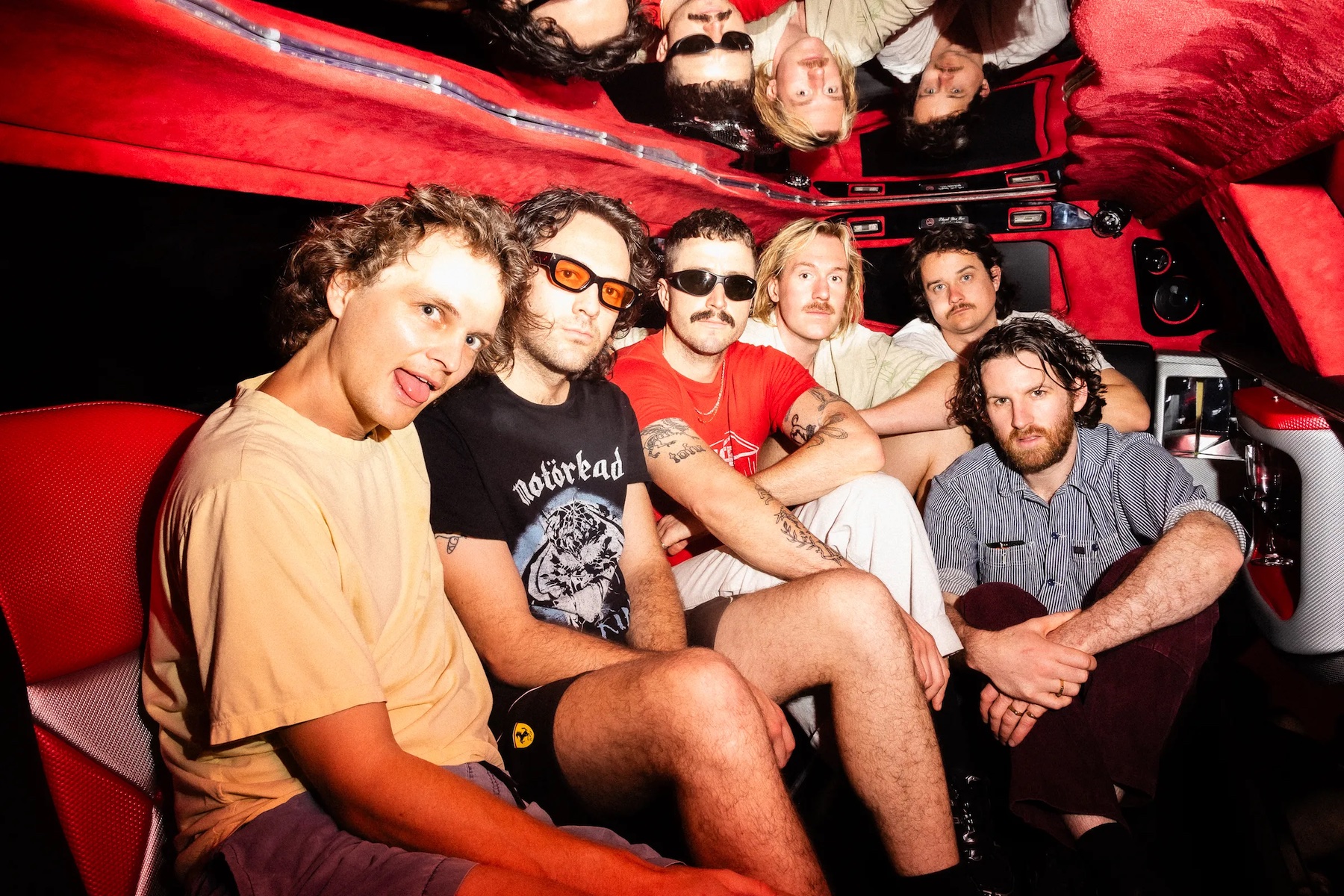
From left, Mackenzie, Cavanagh, Walker, Craig, Kenny-Smith, and Harwood at Forest Hills Stadium, August 2024. Photo: Griffin Lotz for Rolling Stone US
In the coming weeks, King Gizzard will play places they’ve played before—three shows at Red Rocks, one at the Gorge in Washington state—and places they’ve never played, like St. Louis and Richmond, Virginia. Watching the band explode has been insane, but they’re getting used to it. “A lot of people play a lot more than we do,” Mackenzie says. “It’s kind of like flying in a plane. You can’t think about how you’re 7,000 miles up or you’ll have a panic attack. And that’s kind of how I think about people who follow King Gizzard: Just as it’s incredible that we have technology that allows us to fly up there, it’s incredible that there are thousands of people who come to see us every night. But to me, they’re both abstract concepts.”
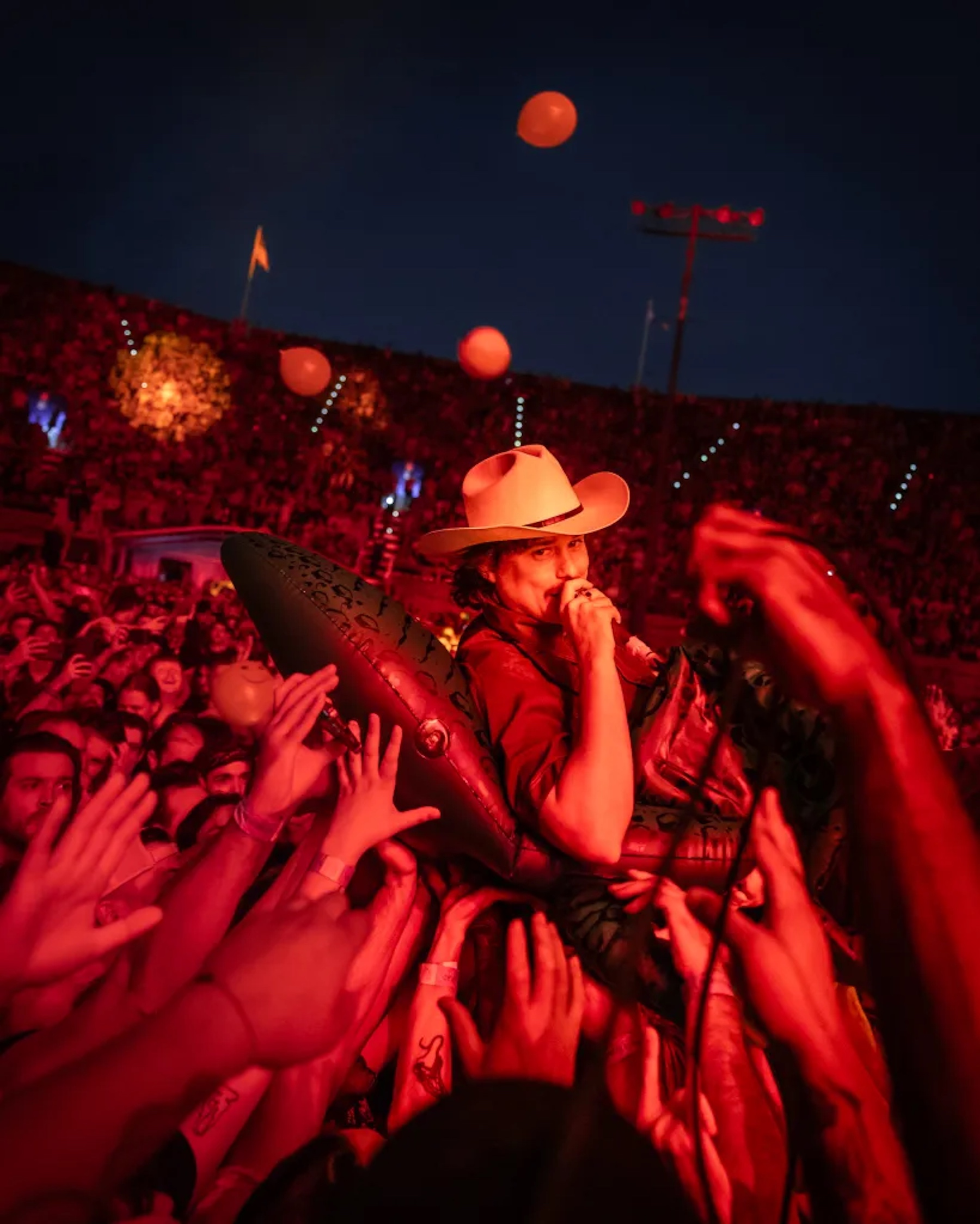
Photo: Griffin Lotz for Rolling Stone US
From Rolling Stone US.

